
57 Things That Christians
Say to Atheists
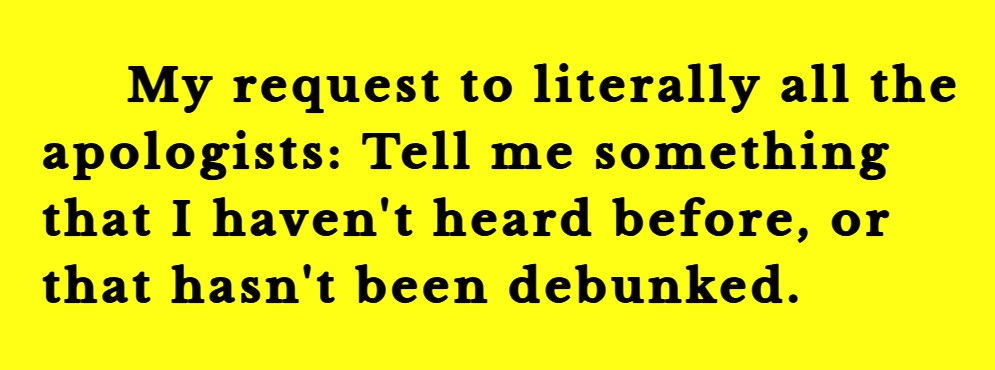
|

|
| 1. "How can something come from nothing?" |
Lawrence Krauss has written an entire book about this.
And I don't mean to get all philosophical but ... what is nothing? Show it to me. I want to study it. I hope you're aware that if we create a perfect vacuum, there are still radio waves and gamma rays and such going through it. We don't have any "nothing" to study. "Nothing" is just an abstract idea that is contrary to existence. If we did have some "nothing" and it failed to produce something during the time that we observed it, that wouldn't prove that it couldn't produce something eventually. In Genesis, God did not create the world "out of nothing" (ex nihilo); chaos existed, and God put it in order ["The earth was without form, and void"]. The fact that science can't explain something right now doesn't mean that it will never be able to explain it. There are things that we haven't (yet) explained. That doesn't mean that the answer is "God did it." It would be as if you were holding a Christmas present, all wrapped up. You might say, "I don't know where this came from. Therefore, Santa Claus exists." "God" should not be the default response when we can't explain something. The correct answer is, "We don't know ... yet." If you attribute everything (all of "creation") to God, you've set up another (bigger) question: Where did God come from? Saying "God did it" is an attempt to solve a mystery by setting up a much bigger mystery. And if you believe that "God always existed," why isn't it possible that the universe just "always existed?" People have a fundamental misunderstanding about the "Big Bang." The "Big Bang" is simply the furthest point back that we can "look" and know anything. We know that about 13.8 billion years ago, the universe was in a hot dense state (I may write a song), and then there was a rapid expansion. We can't "see" past that point with (or rather, based on) our current technology, so that's the moment where physics and time (as we know them now) began, but it's not a theory about "the creation" or the beginning of everything. It's a theory about how far back we can trace the universe using our current understanding of physics. Beyond ("before") the "Big Bang," the laws of physics as we know them break down. It's an event we believe happened a long time ago; it is not a claim about the ultimate beginning of everything. There was a time when the universe was infinitesimally small and infinitely dense. Under such conditions, all the laws of science, and therefore all ability to predict the future, would break down. If there were events earlier than this time, then they could not affect what happens at the present time. Their existence can be ignored because it would have no observational consequences. One could say that time had its beginning at the Big Bang, in the sense that earlier times simply would not be defined. This may not be the simplistic answer you want, but unfortunately, the universe isn't always simple. No matter how improbable you may think it is for the universe to be the way it is without a god, that's completely irrelevant unless you can show that "god did it" is a more likely explanation. "A trillion trillion to one" odds are still better than zero. Imagine that you go to a magic show. The magician puts handcuffs on his assistant and puts her into a large trunk, locking it with chains and padlocks. The magician then stands on top of the trunk. A curtain is raised that hides everything from view for about three seconds, and then the curtain drops — and the assistant is now standing on top of the trunk. When the trunk is unlocked and opened, the magician is inside where the assistant used to be ... and he's wearing her handcuffs! You can't understand how this could possibly happen. A man sitting next to you whispers that he knows how it was done: "It was real magic! It's supernatural — the magician has the power to transform molecules." You don't know how the trick was actually done. Should that lead you to the conclusion that it was "real magic?" 
|
| 2. "America was founded as a Christian nation/the Founding Fathers were all devout Christians." |
Thomas Paine was an atheist. Thomas Jefferson was a theist, not a Christian. The Founding Fathers guaranteed (in the First Amendment) that our national government would not establish any religion.
And remember that (a) the Founding Fathers were slave owners and (b) they believed that women shouldn't be allowed to vote. They didn't get everything 100% right. I'm not sure we were founded as a Christian nation, but we were damn sure founded as a slave-owning nation. In any case ... so what? If the Founding Fathers had, in fact, wanted to establish a "Christian nation," that wouldn't prove the existence of a god. And we're told that during the early years of the Republic, whenever a new town was established, they would use tax money to build a courthouse, a jail, roads, and a church. Some people believe that this is an indication that America is a Christian nation. I believe that this proves something else: the Framers thought of a church as just a community meeting house, a secular place where people got together to swap gossip and have hoedowns, and the religious aspect of it was only incidental. In other words, maybe when they built a "church building," they didn't believe that it was a "religious" structure. And as you know from your study of the New Testament, a church is not a building. |
| 3. "There are no atheists in foxholes." |
This is just plain false.
And if there were more atheists, there would be fewer foxholes. Religion has been the cause of many wars. |
| 4. "If Christianity isn't valid, why do so many people believe in it?" |
Some of the "arguments" in favor of religion (such as this one) are so awful it's as if they've been gift-wrapped for me.
Millions of people believe in astrology. Does that make it valid? There was a time, not too long ago, when everybody on earth — 100% of the population — thought the earth was flat. Truth vs. falsehood isn't the result of a vote. As the philosopher Merle Haggard once said, "I'm right. The world's wrong." If a billion people believe something that's false, it's still false. If 99% of the world converted to Islam, would you just shrug your shoulders and say, "Oh well ... I guess I'll convert to Islam ... majority rule"? |
| 5. "If Christianity isn't valid, why has it been around for thousands of years?" |
For much of human history, the human race was ignorant about everything. The sum total of human knowledge and invention was (a) the wheel, (b) the inclined plane, and (c) written language, which only 3% of the population could read. When people didn't understand phenomena such as lightning, earthquakes, stillborn children, and typhoons, they just said "God" (or "gods") - basically, "magic."
It's not 1133 CE anymore. We now have vaccines, antibiotics, cell phones, laser surgery, MRIs, Hubbell telescopes, and the Internet, and we have put a man on the moon. God/religion was the "default answer" to fill in the blanks when we didn't know something (humans have never liked "blank spaces"). And as you know, Islam has been around for 1300 years. Does that make Islam valid? |
| 6. "Where do your morals come from if you don't believe in God?" |
Morality comes from human brains. I get my morals from my conscience, and from reason.
Objective morality is based on the non-subjective evaluation of the consequences of actions with regard to a goal (i.e., well-being). We are a social species, and we have empathy (well, most of us do). Morality is that which promotes happiness, well-being, or health. It balances harm vs. good, and acknowledges the basic human right of individual personal freedom (balanced against society's need for people not to be thieving murdering assholes). And here is where the Christian apologist might start talking about moral epistemology vs. moral ontology. Ronald Reagan talked about the "maximum amount of personal freedom that is consistent with order." 
Morality is a complex question. It involves affirmative countervailing considerations. Did you have to read the Bible to figure out that murder and theft are morally wrong? No. Your morality comes from your brain, not from a book. Your Bible orders you to kill witches (Ex. 22:18); do you actually do that? Would it be fair to say that you're immoral (according to your holy book) if you don't kill witches? You either obey your god's rules or you don't. If you haven't killed at least one witch, don't tell me that you're living according to the Bible. The Bible says that if a girl gets married and is found not to be a virgin, she should be stoned to death on her father's doorstep (Deut. 22:13ff). In modern times, Christians reject this part of the Bible, but they accept the "Golden Rule." My dear Christian friend, the basis of your morality is your brain, not your book. You should start being honest (with yourself) about this. Do you really believe that everybody around you is hell-bent on raping and killing people, and is restrained only by a belief in an invisible silent deity? If god didn't exist, would you start raping and killing and torturing people? 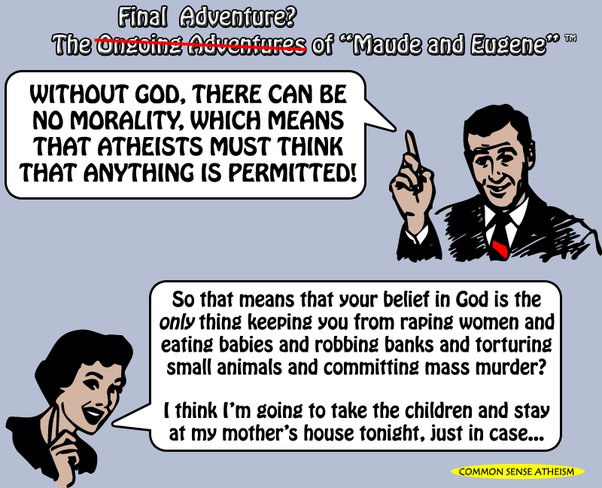
By the way ... it is clear that belief in god does not stop people from doing evil, as evidenced by the many scandals involving Christian clergy (Protestant and Catholic) who sexually abuse children. And another question: If your god ordered you to do something that you know is morally wrong (murder one of your own children, for instance), would you do it? God actually gave such an order in Genesis 22:2. --- Professed atheists make up 0.1% of the prison population in America. ---Professed Christians make up 75% of the prison population. Wouldn't you expect it to be the other way around? Morality is the way that we adapt and adjust to our natural instincts when we're living in a society of other humans. If your morality is something that was codified 3,000 years ago in an old book, you can bet your hat (and ass) that it needs some tweaking. There's nothing wrong with selfishness as long as it's not your only motivation. If I want a good life, I have to help other people because what they do impacts my own life. We could call it a broad-view selfishness (or "rational self-interest"). |
| 7. "My granddaddy wasn't a monkey!" |
You'll need to explain what that has to do with the existence of a god.
You'll also need to explain why humans and chimps share 98.8% of their DNA. Genetically speaking, your "granddaddy" was 98.8% chimpanzee. By the way, evolutionary theory holds that humans evolved from another species of animal. Christians believe that their original ancestor was made out of dirt. 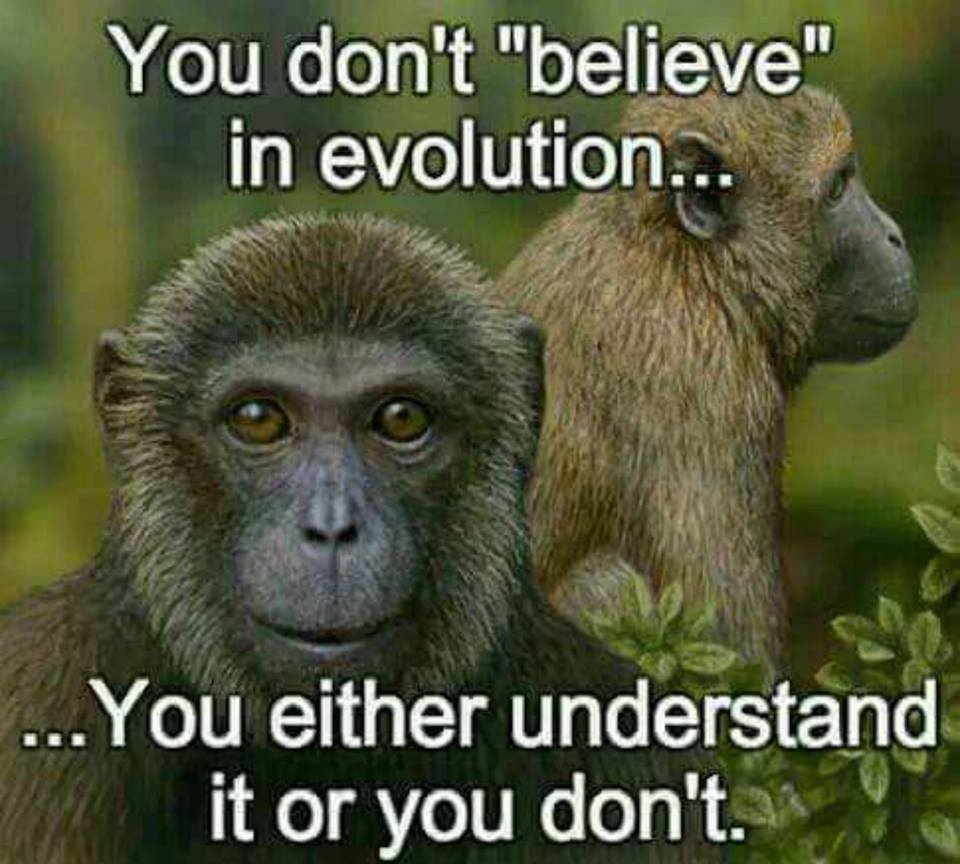
|
| 8. "You atheists just want to keep living a life of sin." |
You're saying that you've adopted a moral system which I reject, and then you accuse me of violating your moral system. So what? You have violated my moral system. So what?
Fortunately, neither one of us is going to hell. |
| 9. "I've had a personal experience with God. God revealed himself to me." |
Good! Now show him to me. Show me your god. Demonstrate him to me, the same way I'd demonstrate my fountain pen or my Ninja food processor. I'm ready and waiting.
If someone actually came up with a valid, irrefutable argument (or demonstration) for the existence of God, it would be in the news — the God-believers would talk about it constantly. Instead, theists give us specious illogical tap-dancing arguments/claims. There are many, many individuals and organizations that have a vested interest in proving the existence of a God. If they had a good argument for God's existence, you'd hear about it constantly. The Christian faith involves magic and miracles. The Bible tells stories of magic and miracles. If the stories and the promises are true, show me. Imagine that I describe to you my belief system that involves me being able to levitate ten feet off the ground. You politely ask me to do the levitation. Instead of me doing it, I start making excuses: "It doesn't work because you don't have enough faith. You have to have faith in order for me to activate the magic." Or I might tell you that "the age of magic is past." See how this works? Extraordinary claims demand extraordinary evidence ... not excuses. |
| 10. "Evolution is just a theory." |
This has nothing to do with the existence of a god. If
the theory of evolution
were disproven tomorrow, it wouldn't have any effect on whether or not a god exists.
And by the way, "theory" is a scientific term, and you might not have a good understanding of what it means. Gravity is a theory too. |
|
11. "It takes more faith to be an atheist than to be a Christian."
(Or: "Atheism is a religion too.") (Or: "I don't have enough faith to be an atheist.") |
Explain to me how one needs faith in order to not believe something.
A rational person goes where the evidence points. If atheism is a religion, then celibacy is a sexual position. If atheism is a religion, then an empty bowl is a type of food. If atheism is a religion, then baldness is a hair style. Ricky Gevais said, "Saying that atheism is a religion is like saying that not going skiing is a hobby." And by the way ... if atheism is a religion, it's the only one that pays taxes. I'm going to offer you a suggestion, and it comes right out of your Bible: "Test all things; hold fast what is good." (I Thess. 5:21) Regarding religion, Neil DeGrasse Tyson put it this way: "I remain unconvinced." |
|
12. "If you don't believe in God, what do you believe in?"
(Variation: "Atheists don't believe in anything.") |
I believe in lots of things that have demonstrated themselves to me and are repeatable. God has not demonstrated himself to me. No evidence, no belief.
I believe that human hands can solve human problems. And I definitely believe in the scientific method. Atheists don't believe anything on faith. |
| 13. "You were never a true Christian." |
If you mean that I "never had a relationship with the risen Christ," you're absolutely correct.
If you're suggesting that I never actually believed, you're dead wrong. If you and I were standing on a street corner tomorrow talking about the weather, and the Religion Police approached us with guns drawn and said, "We are now going to kill whichever one of you is a lesser Christian. The better Christian gets to live! Tell us everything you know about the Bible." Five minutes later, I'd be in my car going home, and you'd be lying on the sidewalk bleeding. What you're really saying is, "I don't want to acknowledge that a person who was once a believing Christian could stop believing in Jesus. If this could happen to you, I'm scared that it might happen to me." Telling me that I was never a true Christian is like telling a divorced man that because he got a divorce, it means he was never married. |
| 14. "You're just angry at God because something bad happened in your childhood." |
Nope. I might just as well say (conjecture) that you're clinging to an imaginary Sky Daddy because of something bad that happened in your childhood.
And by the way, I had a childhood that was like everybody else's: Imperfect (not that it's any of your goddam business). And I can't be angry at a god I don't believe in. Although the descriptions of "God" that I read in the Bible make me want to throw up. Think about it: If I were "angry at god," I wouldn't be an atheist! But there's a reason that atheists sometimes get irritated by religionists. |
| 15. "Some Christian(s) must have really hurt your feelings at some point." |
Christians have hurt my feelings, and Christians have been kind to me, and Christians have even gone to bed with me and had sex (and it was GOOD sex). But that's because Christians are just like everybody else.
But yes, occasionally a Christian has been a jerk. |
|
16. "You're taking that Bible verse out of context."
[or "You're cherry-picking Bible verses!"] |
Let's get out our Bibles — you pick the translation, or we can read it in Greek or Hebrew — let's look up this verse, and you can show me how the context makes any difference in what it (probably very clearly) says.
Christians always say that Psalm 137:8-9 is "taken out of context." They never say that about I John 4:8. |
| 17. "What if you're wrong?" |
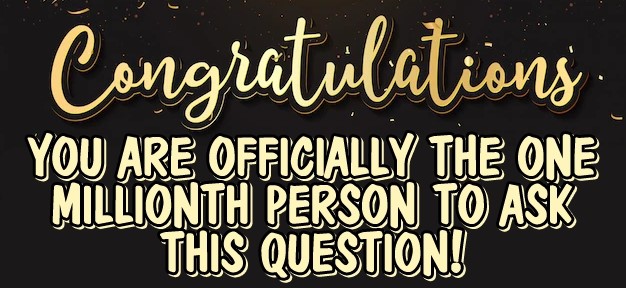
I'll admit that I could be wrong. Are you honest enough to admit that you could be wrong? [Pause ... crickets start chirping as I wait for an answer to a simple question] My margin of error is always "plus or minus 100 percent." What if you're wrong? What if you die, and you stand before the Throne of Judgment, and sitting there is ... Ratatoskr, the squirrel of Yggdrasil? You've been worshipping the wrong deity all your life! You're fucked! Think about it: Your religion prohibits you from asking yourself if you might be wrong. You are required to trust and obey and have faith. That is the biggest difference between your position and my position: I am allowed to use my brain and my critical faculties. If Bblegod wants my respect, he has to drop the demand that I never subject him to questions or ridicule. Yes, I may find myself standing one day before the Almighty One Himself ... Biblegod. This God would be acutely aware of the causal chain of events that led to my personality and my lack of belief — my psyche, my outlook on life. He would understand that I am a product of my learning and my experiences, every interaction that I've ever had with my friends and enemies. He would have an intimate understanding of my reasoning and my thought processes — how I arrived at my conclusions. He would know how I deal with religious claims — how I don't accept them at face value ("on faith"). He's omniscient. I wouldn't be a mystery to him. He would understand that I am nothing more and nothing less than the result of (a) how he made me and (b) the experiences that I've had in my life. He would know about my 40 years of serious, honest Bible study, how I learned enough Greek and Hebrew that I could verify any verse in any English translation that was problematic or particularly interesting. He would know exactly which Bible verses convinced me that he is immoral and ignorant — convinced me that his knowledge of basic medicine, cosmology, and biology is pretty much on the level of a Bronze Age goat herder. And because the god would have all this knowledge, he would let me into heaven. That would be the right thing to do. If your god knows all about me and is still willing to consign me to hell for all eternity ... fuck him. |
|
18. "Better safe than sorry! You should believe in God, just in case there is a hell."
[Pascal's Wager] |
First: That's not how beliefs are formed. You don't wake up one morning and say, "Hey, I'll believe in Muhammad and the Quran today."
Second: It isn't a binary choice. It's not "either (a) the Christian god or (b) no gods at all." Binary thinking is the enemy of critical thinking. There are almost always more than two possibilities. There are lots of "third choices." Islam? Wicca? Buddhism? Shouldn't you be afraid of the "hells" of those religions? [NOTE: Wicca doesn't actually have a "hell."] And in any case, wouldn't your god know that I'm faking it, if I "decided" to believe? An omniscient god would know that I don't really believe in him (Heb. 4:13). Hey, let's cover all the bases: Why don't you hang garlic over your door, just in case Dracula exists? And get some silver bullets in case a werewolf shows up! |
| 19. "The eye is too complex to have evolved." |
Scientists now believe that the eye evolved separately in several different animals.
But in any case ... evolution being false would NOT mean that your god exists. |
| 20. "Scientist X believes in God." | So what? One scientist believes in your god. How is that more significant than 30,000 scientists who don't believe in your god? |
| 21. "God exists because the Bible tells me so." |
Iron Man exists because a book tells me so.
And here are some other entities who exist because I read a book about them: the Scarlet Pimpernel, James Bond, Captain Ahab, the Artful Dodger, Jay Gatsby, Holden Caulfield, Sam Spade, Dr. Frankenstein, Dorian Gray, Zaphod Beeblebrox, Rosencrantz, Guildenstern, Mike Hammer, Simon Legree ... I think you're saying that God wrote the Bible, and the Bible verifies the existence of God, and therefore God exists. This argument is so circular that it looks like a big fucking pizza. |
| 22. "All belief systems deserve respect." |
 Then you should respect my sincerely-held belief in the
Flying Spaghetti Monster.
Then you should respect my sincerely-held belief in the
Flying Spaghetti Monster.
And by the way, I happen to be an ordained minister in the United Church of Bacon. And I expect you to show respect for that. How much respect would you have for an evangelist from the First Church of Goofy? |
| 23. "They found Noah's ark." | AGAIN???? |
| 24. "Would the apostles/martyrs have died for a lie?" |
Would all those Nazi soldiers have died for a lie? We may need to take a closer look at the doctrine of Aryan superiority.
Let's imagine two numbers: a. the number of people who have been killed because they believed in god; b. the number of people who have been killed because they didn't believe in god. Which number to you think would be bigger? If you're willing to die for something, it simply means that you believe it sincerely. It doesn't mean it's true. |
| 25. "That's the Old Testament. Read the New Testament!" |
 Here, let me have your Bible so that I can tear out the 74% that you say is no longer valid.
Here, let me have your Bible so that I can tear out the 74% that you say is no longer valid.
And I assume that you don't want to toss out all of the Old Testament — I assume that you don't want to toss out the parts that Jesus specifically affirmed (quoted). Adultery, false witness, the Sabbath ... I guess we'll keep those, and throw out the rest of the O.T. I assume you'll also want to retain the Old Testament passages that "prophesy" the Messiah and the Apocalypse. But Jesus never mentioned homosexuality (it's specifically condemned in the OT). I guess this means we can toss out the Old Testament commandments against homosexuality (Lev. 18:22)? If we keep part of the OT and throw out the rest, we're going to need to have some guidelines. I bet your criterion is weirdness — you want to ignore the OT stuff about — animal sacrifices; — purification after one's menstrual cycle (Lev. 15:19ff); — boiling a goat in its mother's milk (Ex. 23:19); — the magic adultery test (Numbers 5:11ff); — the approval of the brutal murder of infants (Psalm 137:8-9). But let's keep Psalm 23 and Isaiah 55 (they make us feel good). Anyway, the whole idea of "canceling" the Old Testament, or any part of it, seems questionable, based on the rule that God doesn't change. He told us so himself: "For I am the Lord, I do not change." (Malachi 3:6). When Christians study the Bible nowadays, they have to figure out where to apply the "mental whiteout." |
| 26. "Hitler [or Pol Pot or Stalin] was an atheist." |
If you're going to judge a group by a few of its worst members,
you ought to take a look at the skeletons in your own closet (i.e., Christians).
Do you actually believe that atheism is a gateway drug to genocide? Seriously? Even if there were evil people throughout history who were atheists, you'd still need to connect the dots to show that their atheism caused their evil behavior. Correlation is not the same as causation. And by the way, Hitler was a professing Christian. In a speech in the early years of his rule, Hitler declared himself "not a Catholic, but a German Christian." |
|
27. "Christianity is not a religion, it's a relationship."
(A variation of this is "You don't need religion, you need JESUS!") |
Nope. Christianity is a system that describes a Supreme Being and how to have a relationship with him/it, and it lays down moral rules.
That's what people call a religion. Christianity fits (100%) the definition of religion. |
| 28. "Darwin had a deathbed conversion." |
This is just a flat-out lie. But if he did have a deathbed conversion ... so what? It doesn't prove the existence of your god.
Hey, I can make up stories too: "Billy Graham renounced Christ when he was on his deathbed. He called his friends close and he whispered, 'I can't believe you guys bought into this Jesus bullshit.' Then he died." |
| 29. "There are no transitional fossils." |
This has nothing to do with the existence of a god.
But to the extent that this is an objection to the theory of evolution: This is a "shell game" that Christians play: If we find a "transitional fossil," Christians will then claim that there are two more "gaps," one on either side of the transitional fossil. The fossil record is, unfortunately, incomplete. Kind of like your Bible. |
| 30. "Prove that God doesn't exist." |
This is called a "misplaced burden of proof." Basically, this question/challenge is a Christian scam.
One Christian phrased it this way: "Do you believe that God does not exist? Because you either believe that or you don't." Different wording, same scam (and it's also a false dilemma). I wasn't aware that anyone had proved that god does exist. Can you prove • that there are no vampire space penguins living in hidden caves on the moon? • that Bigfoot doesn't exist? • that the Tooth Fairy doesn't exist? Can you prove that Mohammed didn't split the moon in half? Millions of Moslems believe that he did. Disbelief in the God of Abraham does not require that one search the entire cosmos and find him absent; it only requires that one understand that the evidence put forward by believers is insufficient. And we'll need a tight definition of what a "god" is. Some people's idea of god is the feeling you get when you hold a newborn baby, or when you watch the sun set behind a beautiful mountain [cue the soft piano music]. And the usual organized-religion definitions of "god" are such that it's easy for him/her/it to evade detection and "proof." More about that here. No, technically you can't prove that god doesn't exist. However ... Some people use the word "God" as a euphemism for the mystery of the origin of the universe. In other words, they're NOT talking about the god of the Bible. Faith hates nothing more than the burden of proof. 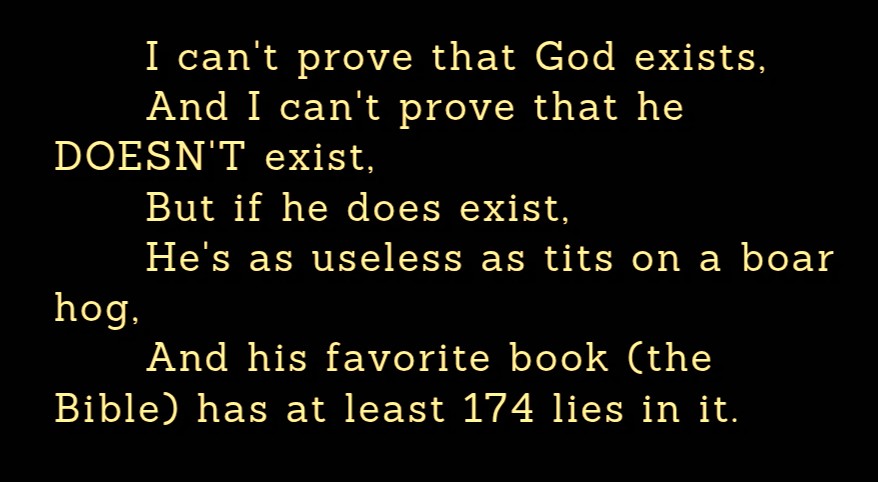
|
| 31. "Why do you want to steal my joy?" | Why do you ask me to suck up to a non-existent celestial tyrant who doesn't let women speak in church (I Cor. 14:34) and endorses slavery (Exodus 21) and the murder of infants (Psalm 137:8-9)? |
| 32. "For somebody who doesn't believe in religion, you sure do talk about it a lot!" |
I talk a lot about religion for the same reason that a police detective talks a lot about crime: It's prevalent, it's pernicious, it's harmful, it's difficult to ignore, and the world would be better off without it.
You Christians don't have the exclusive right to talk about religion. I can talk about it too. And by the way, I talk about a lot of things that I don't believe exist. Like Narnia ... Bigfoot ... Hillary Clinton's moral code ... Darth Vader ... Rocky's first fight with Apollo Creed (it shouldn't have been a split decision! I saw it!). And I confess ... I'm in love with the truth. |
| 33. "You may not believe in God, but he believes in you." |
You say he believes in me? Then let him come tell me. I don't want "messages" from humans; let god speak for himself. I'll be waiting.
Of course your god would believe in me! I've demonstrated my existence! I talk to people and answer their questions — something God doesn't do. Think about it ... a god who can create the universe in six days ... but he's a deaf-mute. He loves us so much ... but he won't even talk to us! By the way, in some states, in their divorce statutes, when a spouse refuses to talk to his wife — "the silent treatment" — it constitutes cruelty. |
|
34. "You don't understand the Bible. That's why you're an atheist."
Or: "You're not a theologian, so you can't understand this." Or: "You don't have the Holy Spirit. The natural man does not receive the things of the Spirit of God." |
I will match knowledge of the Bible with you any day of the week. In fact, it is my study of the Bible (and my understanding of the Bible) that led me to atheism.
Also: Why would God create a human race that was unable to understand him? He's God. He can do anything. He could have designed the human race to have enough wisdom to figure him out (and by the way, he didn't have to give us tonsils. Or an appendix. And he didn't have to put nipples on men). God could have "made it plain and skipped all the games." But instead, he deliberately created us in such a way that we couldn't understand him, and would doubt his very existence. And I contend that I am more of a "theologian" that you'll ever be. |
| 35. "Without God, how can you have a purpose in life? How can you have love?" |
I don't know. But here I am. Fulfillment, love, happiness, all wrapped up in this wonderful "me" package ... no god necessary.
Some people have a psychological need to think of themselves as children being taken care of by an omnipotent omniscient benevolent loving Superdaddy. They want an emotional escape from all the terrors and turmoils of real life. The idea of a Heavenly Father makes everything less terrifying. But we shouldn't "believe" something just because it's a pleasant, comforting idea. "Hey, I'm short on facts, but I make up for it with sincerity." William Lane Craig has stated that it is impossible for atheists to have meaning and purpose in their lives. This is a testable claim which has actually been refuted. |
| 36. "God is beyond the ability of science to detect him." |
This is called "playing the mystery card."
This is Carl Sagan's "invisible dragon." And it's a cowardly cop-out. 
|
| 36a. "You're judging God from a limited, human understanding. You don't know enough, you're not smart enough, to be able to say that there isn't some higher purpose in God's plan ... even if people are suffering, even if the Bible seems to contradict itself ... because you can't see the entire universe. You can't see from beginning to end (Isaiah 55:8-9)." |
This is the "Well, It's Beyond Everybody's Understanding" argument. This could be used as a response to ANYTHING.
Hey, I just raped your daughter. Don't get mad; it's part of a Bigger Plan that you can't possibly understand. Like when six million Jews died back in the 1940s. Like when the 2004 tsunami killed 250,000 people in 12 different countries. Don't try to understand it; you can't! You don't really believe this. If you did believe it, why would you do ANYTHING? Why go to work? God will either let you starve, or he won't. Cause and effect, life and death, love and hate ... nothing means anything if there's some Almighty Being (who is so smart) running everything from behind the scenes, like it's a puppet show. "He's God. He doesn't owe us an explanation." I call this the "Get Out of Morality Free" card. This is the kind of relationship that you find in domestic abuse — a 260-pound weightlifter who's married to a 108-pound woman. "You'd better not leave me, woman! If you do, I'll hurt you. And if I harm you, it's for your own benefit." This is the language of an ABUSER. |
| 37. "If you pray hard enough, God will reveal himself to you. You just haven't prayed hard enough." |
Oh, so that's the problem. I'll try to pray better.
My most recent prayer to God was, "Another mass shooting ... you sat up there in heaven and watched, and did nothing ... fuck you, you worthless son of a bitch." I could do better than this. I could be a better God than Biblegod. If I were omnipotent, I would stop all mass shootings, all cancer, all rape, all torture, all inflation, all the weather disasters, all the earthquakes, all the babies that are born deformed. |
| 38. [From Kirk Cameron] "Have you ever lied? Then you're a liar!!!" |
[Nobody's sure what this has to do with the existence of a god, but Kirk Cameron has never been accused of clear thinking]
No, Kirk ... I've actually done lots of good stuff. I could give you a list. I've done more good in the last six months than your imaginary god EVER did. I'm not a liar. I'm a do-gooder. If you don't believe me, follow me around for a few weeks. And by the way, fuck you, Kirk Cameron, you Christmongering narrow-minded shitferbrains asshole. |
| 39. "You're just going through a phase." |
I'll let you know when the "phase" is over.
Frankly, I think that God is going through a phase, where he allows war, school shootings, sex trafficking of children, and killer heat waves in Europe. It seems that the world with God operates exactly the same as a world without God. |
| 40. "You know there's a God, and you're lying about it (Romans 1:20ff)." |
Want me to take a polygraph?
Perhaps the one who's lying is you — you say you believe in God, but you really don't. When I write a book about this, I'm going to call it Romans. My book will say that "you have become filled with every kind of wickedness, evil, greed, and depravity — you are full of envy, murder, strife, deceit and malice — you're a gossip, a slanderer, insolent, arrogant, and boastful; you invent ways of doing evil; you disobey your parents; you have no understanding, no fidelity, no love, no mercy." (Rom. 1:29-31) |
| 41. "If you don't believe in God, why don't you just go ahead and kill yourself?" |
Just because God means everything to you doesn't mean that he means everything to me. I am sane and emotionally mature (my mother had me tested), and I can find meaning in my life without resorting to a make-believe Superfriend.
If you discovered tomorrow that your god doesn't exist, would you kill yourself? |
| 42. "The fool says in his heart, 'There is no god.'" (Psalm 14:1) |
This is not an argument. It is simply an ad hominem attack.
So ... you have a book that says I'm a fool. How charming. I think I'm going to go write a book about Christians. Guess what it's going to say? And my book will be exactly as valid as your book. No, it will be more valid, because it was written less than 2000 years ago. And — not to put too fine a point on it — you seem to be mischaracterizing the atheist position. Most atheists do not positively assert that there is no god. They simply lack a belief in the existence of any god. You should be able to figure out the difference. Although I confess that I have sometimes been bold enough to state affirmatively that "God" does not exist. |
|
43. "God has fine-tuned the universe for life. The exact quantity of each physical constant and the respective ratios must all be precisely as they are in order for life to exist. The tiniest change to one of these constants would not only prohibit life as we know it — it would make most forms of matter impossible as well. Our universe is not merely fine-tuned to allow for 'some kind' of life; it is arranged in the only way that allows for any life at all."
[Alternative] "You can't have a watch without a watchmaker!" |
"The orderly design of the universe" - this is the "fine tuning" argument, which has been thoroughly debunked.
The universe is not fine-tuned for life. As far as we know, intelligent life occurs in only one million-billion-billion-billionth of the universe around us. The universe is not teeming with life. If some intelligent god were going to design a universe to host life, he would have done a much better job. Imagine if you took a spaceship out into the solar system - 100,000 miles or so. You open the hatch and toss your friend out into space. 99.9999% of the universe would kill him instantly. Our own tiny planet? 70% of it is covered with salt water — uninhabitable by humans. And the two polar ice caps? Also uninhabitable by humans. If you don't believe me, listen to what Neil DeGrasse Tyson said. If the universe is "fine-tuned" for anything, it is for the formation of black holes. If the universe were a three-bedroom house, the portion of it that is habitable by life is the size of a proton. Pick a random cubic mile of our universe; now try making a case for theism/god - given only the contents of that cube. What if the universe were different — "tuned" differently? It wouldn't produce the sort of life forms that we see around us, but do you really know that it wouldn't produce just as much life as this universe? Do you really think you know enough about the various possible types of life (and about the consequences of fiddling with fundamental constants) to work that out? We have a hard enough time figuring out and understanding our own universe, even though it's right here under our noses and available for study. Douglas Adams uses the "puddle analogy:" 
"This is rather as if you imagine a puddle waking up one morning and thinking, 'This is an interesting world I find myself in - an interesting hole I find myself in - fits me rather neatly, doesn't it? In fact it fits me staggeringly well, must have been made to have me in it!' This is such a powerful idea that as the sun rises in the sky and the air heats up and as, gradually, the puddle gets smaller and smaller, frantically hanging on to the notion that everything's going to be alright, because this world was meant to have him in it, was built to have him in it; so the moment he disappears catches him rather by surprise. I think this may be something we need to be on the watch for." And gosh, isn't it amazing how those rivers flow right along the state boundaries? God is so wonderful! Isn't it predictable that the things that come to be in a universe will be things that are highly characteristic of that universe? Things fitting exactly to their environment is exactly what you expect in a non-intelligent (random) "design." The occurrence of things for which their environment was not "just right" would be a far better indicator of intelligent intervention. For example, an animal being in a zoo is indicative of intelligent intervention; an animal that fits perfectly into its ecological niche is not an indication of intelligent design, but instead is amply explained by non-intelligent processes such as evolution. Even if our universe is "unique," so what? The things that are present in a unique universe will always be specific to that universe. In the same way, if you throw one dice 1000 times, you create a highly improbable number ... would you argue that the universe was "fine-tuned" to produce the number you just got? No - there could simply have been some other number. The outcome would only be remarkable if there was something special about that number. By the way, why would God fine-tune the universe for life when he could fine-tune life for the universe ... the way evolution does? The tendency to see patterns where there aren't any patterns is called pareidolia. Imagine that you had 50 dice, and you threw them out onto a hardwood floor. Don't you think you'd find "patterns" in the dice, in the way they turned up ("Gosh, I just rolled two 12's in a row!")? The "creator" explanation gets you nowhere — it explains nothing. It gives us something that's even harder to explain, even more remarkable, even more improbable — god. Where did he come from? |
| 44. "What would it take to make you believe in God?" |
I don't know. If your god is omniscient, he knows what it is, and he hasn't done it yet.
Hmmm ... if your god wrote my computer password on the moon (on the side of the moon that always faces us) in huge letters that everybody on earth could read without a telescope ... that would be a start. (Me: "Fuck, there is a god ... but now I have to change my password!") P.S. My current computer password is ShoesForIndustryCompadre. I would need to get a good definition of "god." The definitions I've heard so far are all self-contradictory. It seems to me that if some all-powerful all-knowing Being did exist, there would be so much evidence for him that nobody would ever doubt his/its existence. But as far as I can tell, the universe rolls along exactly the way it would if such a Being did not exist. |
| 45. "Why do atheists fight so hard against something they say doesn't exist?" |
I would never say that Christianity doesn't exist.
(If you like, I can take you over to one of their tax-exempt buildings.) Atheists aren't arguing with god. They're arguing with you. And yes, atheists will sometimes seem angry. |
| 46. "I know because I know because I know!!!!" |
If you actually know, that means you don't have faith. Is that what you're saying?
You'll want to take a close look at Hebrews 11:6. Knowledge is justified belief that can be If you can't show it, then you don't know it. If you cannot confirm your convictions, then there is no way to know what you think you know. If gods and miracles were a part of reality, there would be a way to know about them that wouldn't require faith. Christianity is not a mental disease. But it acts like a mental disease, because it is a delusion — a delusion caused by conditioning rather than pathology. A delusion is defined as "a persistent false belief that does not change in spite of conflicting evidence." What you're asking me to do is to believe, in the absence of evidence, simply because you've stated something. "I said it ... so there!" Your personal experience may be "revelation" to you, but to everybody else, it's hearsay. |
| 47. "Are you afraid of death?" |
Not particularly. I do my best to avoid it. I take vitamins, and I visit my doctor regularly.
A person's attitude about death doesn't say much about whether or not he's religious. If a person completely neglects his health and takes ridiculous risks, it may be an indication of his mental health (or lack thereof). We are born with an instinct for self-preservation, just like the rabbits and the rats. |
| 48. "What's the evidence for atheism?" |
I think you're asking me for evidence about something that I don't believe (i.e., theism).
I don't believe in the existence of a god. What is your evidence for not believing in Santa Claus? What is your evidence for not believing in the Tooth Fairy? Atheism is not a worldview or a viewpoint. It is the answer to one single question: "Do you believe that a god exists?" And my answer is "No." How does one give evidence for not believing something? One could say that atheism is not a "thing" — it is the lack of a "thing." |
| 49. "I'll be praying for you." |
I'd like to get some specifics about this, if you don't mind.
As I understand it, prayer is when you're asking God to do something. What will your prayer ask for? What exactly will you be asking God to do? I want to know so that I can watch for the results. |
| 50. "That's a mistranslation of that [Bible] verse." |
Okay. Let's you and me get together and translate that verse. No need for us to trust those snooty "translators" when we can do it ourselves.
If it's in the New Testament, I'll bring my copy of The Greek New Testament by Kurt Aland et al. (second edition ©1968). I'll also bring my well-worn copy of A Greek-English Lexicon of the New Testament and Other Early Christian Literature (Bauer-Arndt-Gingrich, ©1957). If it's a verse in the Old Testament, I'll bring my Biblia Hebraica Stuttgartensia (©1977). I'll also bring The New Brown-Driver-Briggs-Gesenius Hebrew-English Lexicon (©1979.) You can, of course, bring your own resources if you object to mine. What Bible verse did you say that was? |
| 51. "God doesn't send anybody to hell. People choose to go to hell." |
But God makes all the rules about going to heaven vs. going to hell.
And if you read the Bible, you'll find that those rules are pretty confusing. Think of when Vinnie the Mafia Guy comes into your restaurant. He says, "Nice place ya got here. Be a shame if something happened to it ... like a fire. You wanna pay us some protection money each month? It's your choice." I might say to my wife, "If you are disrespectful to me, I'm going to punch you in the face." One day she is disrespectful (that's how I assess what she said to me), and I punch her. Did she make a choice? It's my decision — it's always my decision — about whether or not I'm going to punch my wife in the face. If I love her — if I really love her — I can decide that I will never punch her in the face, no matter what. It is a fucked-up shitty husband who punches his wife — for any reason. And it's a fucked-up shitty God who claims to love you but sends you to hell for all eternity. MAKING A THREAT is not the same as GIVING SOMEBODY A CHOICE. It's TWO DIFFERENT THINGS. God does not offer us a free choice. He makes a threat (the worst threat that anybody could ever imagine). God's invitation (to make a "choice") involves duress. He gives an ultimatum. "Hey guys, I can make your hell problem go away ... you know, the problem I created ... for a price." Imagine that I get arrested for bank robbery. My defense is: "The teller voluntarily gave me the money!" But the evidence shows that I was pointing a shotgun at his head. Did he "make a free choice?" It's not a choice that's freely made. Hey God ... how about taking the gun away from my head before "offering me a choice?" If you still don't understand this concept, take a look *HERE. Question: Do you have somebody in your life that you truly love with all your heart? Next question: What would that person have to do that's so bad that you would torture him FOREVER? Christopher Hitchens once said, "God creates us defective and then commands us to be perfect." |
| 52. "I've been going to the same zoo for 27 years, and I've never seen a monkey turn into a human being." | Just kidding. Even a Christian wouldn't say something that stupid. |
| 53. "If we evolved from monkeys, why are there still monkeys?" |
Modern-day monkeys and apes are not our ancestors.
Humans did not evolve from apes. Humans are apes. About six million years ago, there was a creature (probably Saculanthropus) that is the ancestor of chimpanzees, bonobos, monkeys, and us. No animal that is alive today evolved from any other animal that is alive today. Monkeys are our cousins, not our ancestors. Genetically speaking, chimpanzees are more closely related to humans than chimpanzees are related to gorillas. For a new species to emerge, it is not necessary that it supersede or replace another species. Evolution is any change in heritable characteristics over multiple generations. As long as there is reproduction, there will be evolution. If God made Adam out of dirt, why is there still dirt? If there was an Enlightenment, why are there still stupid people? If Americans came from Europe, why is there still a Europe? |
| 54. "Do you think you have all the answers?" |
I haven't even heard all the questions yet.
Do you think you have all the answers? The most outrageously smug thing you can do is to turn off your brain and say, "God. God is the answer to that question." |
| 55. "You're not going to change my mind, and I'm not going to change yours." |
Maybe. But the difference is that I'm willing to change my mind if somebody gives me a good reason to do so. You won't change your mind, no matter what happens.
Failed prayers, millennia of dead silence from your Imaginary Friend, a "holy" book filled with contradictions and atrocities (including instructions on how to sell your own daughter into slavery — Exodus 21) — not even good common sense can make you give up your ridiculous religion. If you keep clinging to your religion when there's no evidence to justify your beliefs, you don't have "faith" — you're just being stubborn. |
| 56. "I know Jesus said that, because it's in my Bible, in red letters." | [Just kidding. No Christian is that dumb.] |
| 57. "Everybody has faith, even you. Whenever you get onto a commercial airline and fly to another city, you're exercising faith. You didn't meet the pilot; you didn't check into his qualifications; you didn't even look to see if he's drunk. You have faith in the airline and faith in the pilot." |
Wrong.
I drew a conclusion based on information (and past experiences). I know that airline travel is generally a safe form of travel. I know that the vast majority of people arrive at their destinations intact. It's been happening for years now. I made an informed decision based on things that I know (and have seen). When I go to the grocery store and buy apples, I am assuming that the apples have not been poisoned. That's because I've never bought a poisoned apple from the store, and I've never even heard of anybody buying an apple that was poisoned. Technically, I'm taking a tiny risk when I bite into that apple, but it's the same kind of calculated risk that I take many times each day. It isn't faith. It is trust that has been earned. When I sit down with a good friend and we're looking at his AR-15, I assume that he's not going to shoot me. He could shoot me, of course, but the likelihood is very small. Again, I am taking a tiny risk, based on information ... based on facts. My friend and I have gone shooting together many times, and he has never murdered me. To call this kind of decision-making "faith" is dishonest. |
| Maude and Eugene |
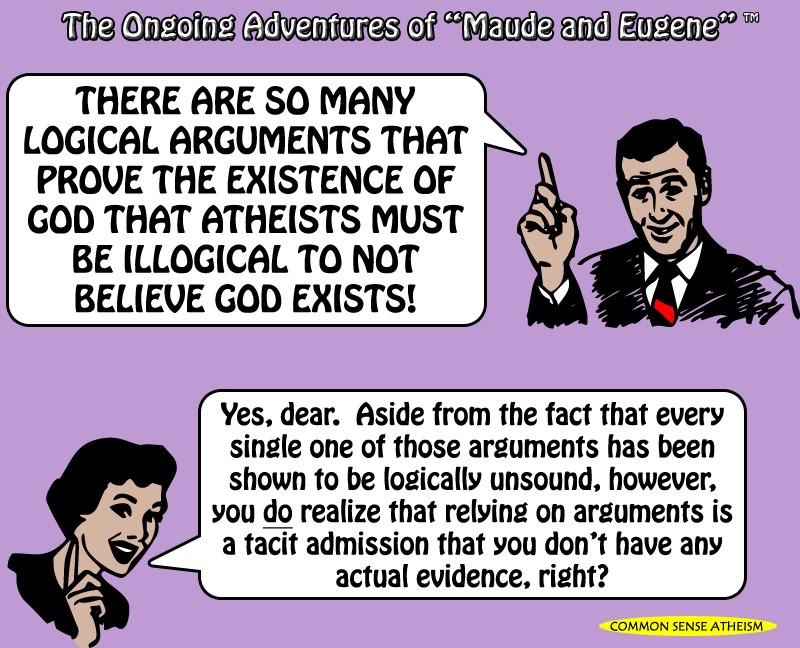
|
|
Standard excuses for God:
(a) "God can do whatever he wants to, because he's God" or (b) "God is holy, and can't allow any sin in his presence" (nobody has ever found an actual Bible verse that says this. In fact, in the first chapter of Job, we read that Satan himself was allowed to come into the presence of God) or (c) "Things are different today from what they were in Biblical times" or (d) "There are a lot of things in the Bible that we just don't understand" or (e) "We just have to trust in God; we have to have faith" or (f) "We can't always understand God; his ways are not our ways" [this is also true of Charles Manson] or (g) "That Bible verse must have been taken out of context ... I'll look it up sometime" or (h) "That's just one of those difficult Bible passages" or (i) "That was back in the Old Testament; it doesn't apply to us" or (j) "I can't explain it, and I don't really understand it, but I still believe in the Bible, no matter what" or (k) "That's not in the original text. I think" or (l) "That was Aramaic/Jewish hyperbole, and shouldn't be taken literally" [how can we determine which Bible passages should be taken literally? What is your litmus test?] or (m) "That's an example of linguistic extreme, or absoluteness being used to express a preference" (translation: Any time the Bible says something ridiculous or disgusting or vicious, it means something else. Otherwise, we'd have proof positive that Biblegod is a demented monster) or (n) "That old canard? I've heard THAT question asked before" [this response beats the hell out of actually answering the question] or (o) "That's just an ancient expression of Oriental imprecation" [Really? Then don't tell me that the Bible is relevant for modern times!] or (p) "Behind much of the thought in the Bible lies a peculiarly Semitic idea of a unitive notion of human personality" [words thrown together that mean absolutely nothing ... another Christian apologist trying to sound intelligent ... can I have some Ranch dressing on that word salad?] or (q) "There's a webpage at http://www.dammit_the_bible_is_true.com that answers that question." (r) "At that time, in that culture ..." |
I hope people understand what my position is on religion.
Some atheists like to fold their arms and tell Christians, "You can't prove that god exists."
That's not what I'm saying. I'm not demanding proof.
But it would be nice if you had some kind of evidence (perhaps some small demonstration).
You don't owe me any explanations, but I Pet. 3:15 requires that you always be prepared to give an answer to everyone who asks you to give the reason for the hope that you have. It's an order from God, right there in your book, along with "Don't commit adultery."
Not my idea. God's idea.
What I'm really interested in is the reason that you believe what you believe.
Imagine that we are in a coffee shop having a non-threatening conversation. We're sitting together at a table, and I ask you, "Why do you believe that a god exists?"
What would you tell me?
I assume that you have some actual reason for believing in your god, other than "It gives me comfort." Technically, that wouldn't be a belief; that's an emotional pacifier.
Beliefs don't live in a vacuum. There is, or should be, a process by which you arrive at your beliefs, a process that involves your brain and not just your emotions.
I don't happen to have a reason to believe in any god. But I'm willing to listen to what you have to say.
It's probably going to be something that I've heard before. Bad arguments never die.

|

|